Examining Legal Framework of Agency in Modern Business
VerifiedAdded on 2023/01/18
|11
|2958
|2
Report
AI Summary
This report provides an overview of the legal aspects of agency in business, focusing on the relevance of the agency principle, the fiduciary relationship between principals and agents, and the different types of agents (general, special, sub-agents, and servants). It explores the authority of agents, differentiating between actual (express and implied) and apparent authority, and discusses the liability of both agents and principals. The report also includes case laws, such as Hely Hutchinson vs Brayhead Ltd and Rama Corporation vs Proved Tin, to illustrate the application of these legal principles in real-world scenarios. The document is available on Desklib, which offers solved assignments and study tools for students.
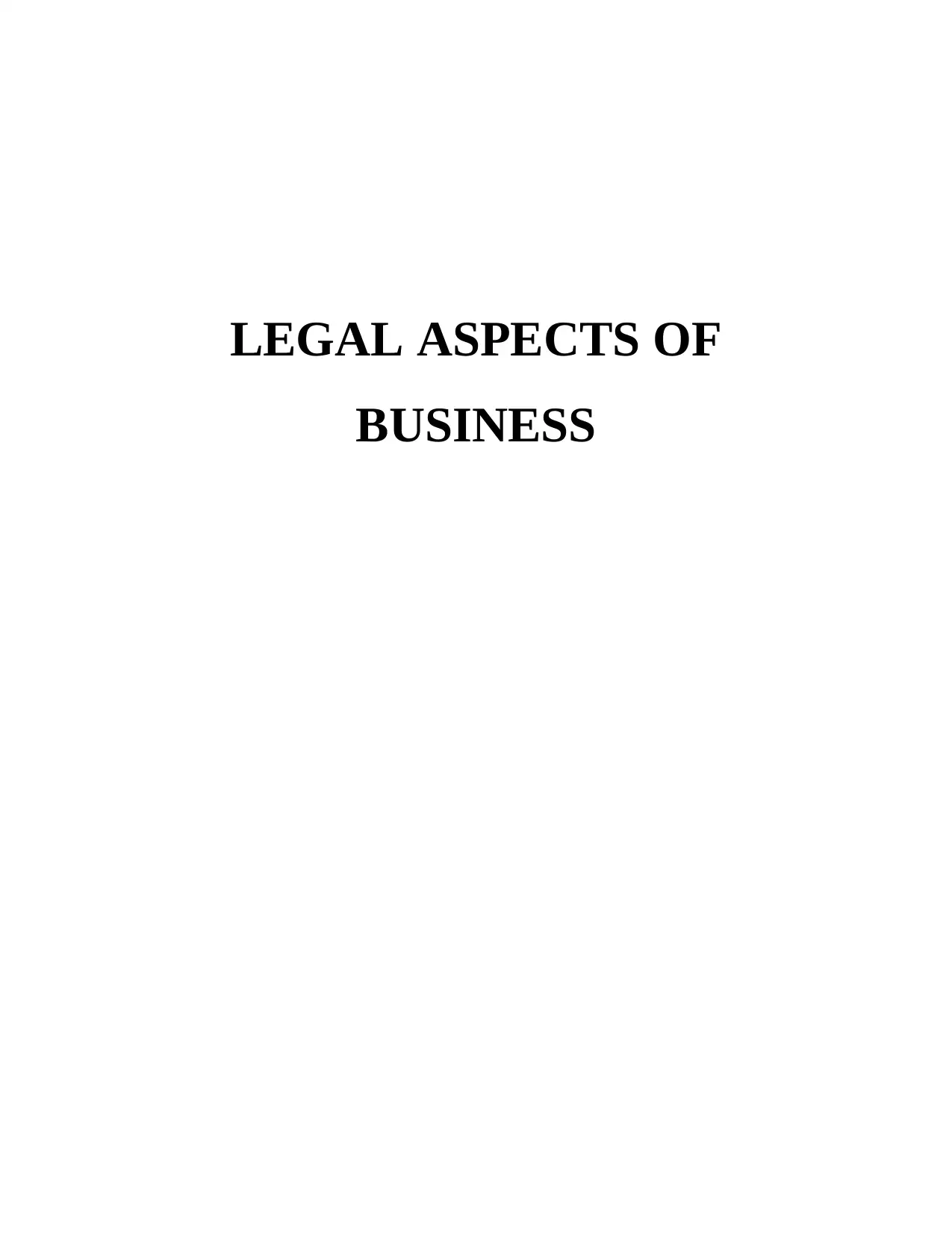
LEGAL ASPECTS OF
BUSINESS
BUSINESS
Paraphrase This Document
Need a fresh take? Get an instant paraphrase of this document with our AI Paraphraser

TABLE OF CONTENTS
INTRODUCTION...........................................................................................................................1
MAIN BODY...................................................................................................................................1
CASE LAWS...................................................................................................................................5
CONCLUSION ...............................................................................................................................7
REFERENCES................................................................................................................................9
INTRODUCTION...........................................................................................................................1
MAIN BODY...................................................................................................................................1
CASE LAWS...................................................................................................................................5
CONCLUSION ...............................................................................................................................7
REFERENCES................................................................................................................................9

INTRODUCTION
Business law refers to body of law governing commerce and business and is considered
part of civil law dealing with private and public law issues. Laws are made for monitoring and
keeping control over the actions of the business enterprise. Agency is very old method of getting
work done through delegating powers to the agents. Principals delegate power to its agents to
carry out work on their behalf. There are number of transaction that are carried out by agents on
behalf of principals. This sector has become so wide because of which various laws have been
established for governing the relationship (Stafford, 2017). Along with the benefits there are
various issues that has arisen harming the principals and the third parties. This report will
provide an understanding about the agency and its associated terms like, key features of agency
relationship. Different types of agent's authority will also be covered. This will give
understanding with reference to relevant case laws.
MAIN BODY
Relevance of Agency
Principle of agency makes company accountable for the business actions regarding the
obligation of action regarding law. Principals are represented by agents for business transactions
and they are expected of representing for best interest of principal. This helps businesses to carry
out number of transactions where the principal could not make the transaction by self. In the
modern times agency relationship is playing very significant role as today business has grown
really very large and it is possible for a person to be available and carry out transactions at
various locations. Therefore agency is important for running the business successfully from
various locations.
Agency
Every relationship under agency is a fiduciary relationship. This shows that agency
relationship requires confidence and trust. Agents are expected to act in best interest of principal
as action of agent would be creating legal obligations for principal. This relationship allows
agents to act on behalf of principal.
Agency is defined as relationship where person under law is recognised to have power of
creating or altering the legal rights and duties and relationship of other person, principal. Agent
performs the work of facilitating contract between third party and principal through introduction
of third party, solicitation of orders from third party or settlement of contracts with third parties
1
Business law refers to body of law governing commerce and business and is considered
part of civil law dealing with private and public law issues. Laws are made for monitoring and
keeping control over the actions of the business enterprise. Agency is very old method of getting
work done through delegating powers to the agents. Principals delegate power to its agents to
carry out work on their behalf. There are number of transaction that are carried out by agents on
behalf of principals. This sector has become so wide because of which various laws have been
established for governing the relationship (Stafford, 2017). Along with the benefits there are
various issues that has arisen harming the principals and the third parties. This report will
provide an understanding about the agency and its associated terms like, key features of agency
relationship. Different types of agent's authority will also be covered. This will give
understanding with reference to relevant case laws.
MAIN BODY
Relevance of Agency
Principle of agency makes company accountable for the business actions regarding the
obligation of action regarding law. Principals are represented by agents for business transactions
and they are expected of representing for best interest of principal. This helps businesses to carry
out number of transactions where the principal could not make the transaction by self. In the
modern times agency relationship is playing very significant role as today business has grown
really very large and it is possible for a person to be available and carry out transactions at
various locations. Therefore agency is important for running the business successfully from
various locations.
Agency
Every relationship under agency is a fiduciary relationship. This shows that agency
relationship requires confidence and trust. Agents are expected to act in best interest of principal
as action of agent would be creating legal obligations for principal. This relationship allows
agents to act on behalf of principal.
Agency is defined as relationship where person under law is recognised to have power of
creating or altering the legal rights and duties and relationship of other person, principal. Agent
performs the work of facilitating contract between third party and principal through introduction
of third party, solicitation of orders from third party or settlement of contracts with third parties
1
⊘ This is a preview!⊘
Do you want full access?
Subscribe today to unlock all pages.

Trusted by 1+ million students worldwide
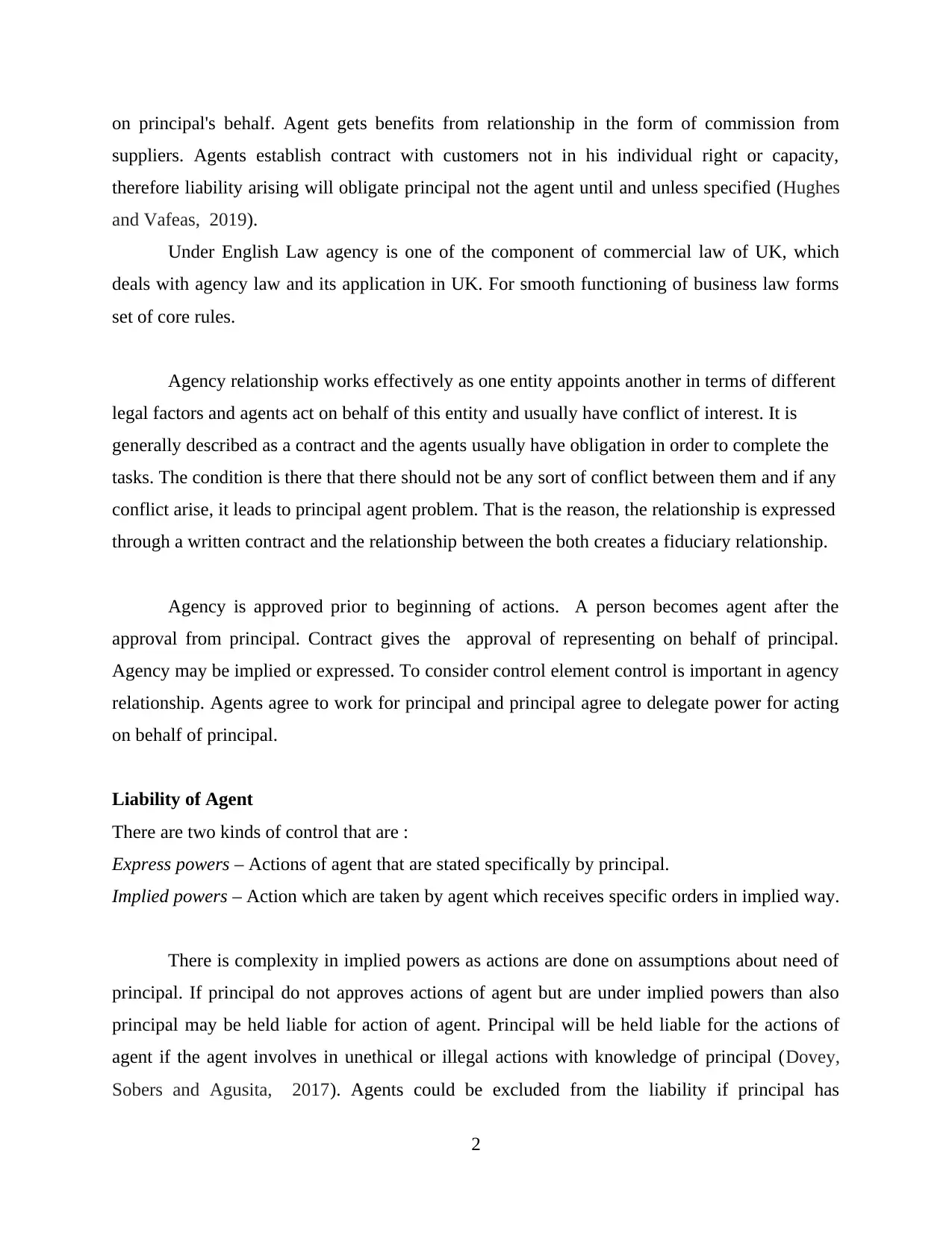
on principal's behalf. Agent gets benefits from relationship in the form of commission from
suppliers. Agents establish contract with customers not in his individual right or capacity,
therefore liability arising will obligate principal not the agent until and unless specified (Hughes
and Vafeas, 2019).
Under English Law agency is one of the component of commercial law of UK, which
deals with agency law and its application in UK. For smooth functioning of business law forms
set of core rules.
Agency relationship works effectively as one entity appoints another in terms of different
legal factors and agents act on behalf of this entity and usually have conflict of interest. It is
generally described as a contract and the agents usually have obligation in order to complete the
tasks. The condition is there that there should not be any sort of conflict between them and if any
conflict arise, it leads to principal agent problem. That is the reason, the relationship is expressed
through a written contract and the relationship between the both creates a fiduciary relationship.
Agency is approved prior to beginning of actions. A person becomes agent after the
approval from principal. Contract gives the approval of representing on behalf of principal.
Agency may be implied or expressed. To consider control element control is important in agency
relationship. Agents agree to work for principal and principal agree to delegate power for acting
on behalf of principal.
Liability of Agent
There are two kinds of control that are :
Express powers – Actions of agent that are stated specifically by principal.
Implied powers – Action which are taken by agent which receives specific orders in implied way.
There is complexity in implied powers as actions are done on assumptions about need of
principal. If principal do not approves actions of agent but are under implied powers than also
principal may be held liable for action of agent. Principal will be held liable for the actions of
agent if the agent involves in unethical or illegal actions with knowledge of principal (Dovey,
Sobers and Agusita, 2017). Agents could be excluded from the liability if principal has
2
suppliers. Agents establish contract with customers not in his individual right or capacity,
therefore liability arising will obligate principal not the agent until and unless specified (Hughes
and Vafeas, 2019).
Under English Law agency is one of the component of commercial law of UK, which
deals with agency law and its application in UK. For smooth functioning of business law forms
set of core rules.
Agency relationship works effectively as one entity appoints another in terms of different
legal factors and agents act on behalf of this entity and usually have conflict of interest. It is
generally described as a contract and the agents usually have obligation in order to complete the
tasks. The condition is there that there should not be any sort of conflict between them and if any
conflict arise, it leads to principal agent problem. That is the reason, the relationship is expressed
through a written contract and the relationship between the both creates a fiduciary relationship.
Agency is approved prior to beginning of actions. A person becomes agent after the
approval from principal. Contract gives the approval of representing on behalf of principal.
Agency may be implied or expressed. To consider control element control is important in agency
relationship. Agents agree to work for principal and principal agree to delegate power for acting
on behalf of principal.
Liability of Agent
There are two kinds of control that are :
Express powers – Actions of agent that are stated specifically by principal.
Implied powers – Action which are taken by agent which receives specific orders in implied way.
There is complexity in implied powers as actions are done on assumptions about need of
principal. If principal do not approves actions of agent but are under implied powers than also
principal may be held liable for action of agent. Principal will be held liable for the actions of
agent if the agent involves in unethical or illegal actions with knowledge of principal (Dovey,
Sobers and Agusita, 2017). Agents could be excluded from the liability if principal has
2
Paraphrase This Document
Need a fresh take? Get an instant paraphrase of this document with our AI Paraphraser

sufficient reason for providing that the acts of agent were outside the scope of their granted
powers.
Types of Agents
Different types of agents.
General Agent
General agents possess authority of carrying out wide range of transaction on behalf and
name of principal. General agent may be managers of business or having limited but ongoing
roles. Person appointed as general agent have the authority of acting in way that is required by
business of the principal. For restricting the authority of agent, limitation on the act are required
to be defined specifically by principal. Normally general agents are business, but they could be
appointed for personal purposes under certain circumstances. Most common form of general
agent is person holding power of attorney of other person (Genus and Iskandarova, 2016).
Special Agents
Special Agents are the ones having specific authority for acting over particularly
designated instances or specifically designated transactions. Example of special agents are real
estate brokers that are hired specifically for finding buyers for land of principal. Special agents
only have the authority of doing work for which they have been authorised. Any act done beyond
the designated will not make principal liable.
Sub Agent
For carrying out duties agents are often required to appoint agents for their own.
Appointment of sub agents are sometimes authorised and sometimes the agents are not
authorised. For example insurance companies may require a general agent to have offices
throughout the cities of state. The general agent could perform the work only by appointing
agent of his own choice. The agents appointed by general agent under his own authority may be
sub agents to principal if they are appointed under implied or express authority by principal.
Both principal and agent of the principal are liable for the acts of sub agents if they are properly
appointed.
Servant
This is final category of agents. Previously in 19th century work and duty of any
employee was subject to control of an employer were termed as servant. In the present times
there has been new restatement where servant is defined as any person who is employed by
3
powers.
Types of Agents
Different types of agents.
General Agent
General agents possess authority of carrying out wide range of transaction on behalf and
name of principal. General agent may be managers of business or having limited but ongoing
roles. Person appointed as general agent have the authority of acting in way that is required by
business of the principal. For restricting the authority of agent, limitation on the act are required
to be defined specifically by principal. Normally general agents are business, but they could be
appointed for personal purposes under certain circumstances. Most common form of general
agent is person holding power of attorney of other person (Genus and Iskandarova, 2016).
Special Agents
Special Agents are the ones having specific authority for acting over particularly
designated instances or specifically designated transactions. Example of special agents are real
estate brokers that are hired specifically for finding buyers for land of principal. Special agents
only have the authority of doing work for which they have been authorised. Any act done beyond
the designated will not make principal liable.
Sub Agent
For carrying out duties agents are often required to appoint agents for their own.
Appointment of sub agents are sometimes authorised and sometimes the agents are not
authorised. For example insurance companies may require a general agent to have offices
throughout the cities of state. The general agent could perform the work only by appointing
agent of his own choice. The agents appointed by general agent under his own authority may be
sub agents to principal if they are appointed under implied or express authority by principal.
Both principal and agent of the principal are liable for the acts of sub agents if they are properly
appointed.
Servant
This is final category of agents. Previously in 19th century work and duty of any
employee was subject to control of an employer were termed as servant. In the present times
there has been new restatement where servant is defined as any person who is employed by
3
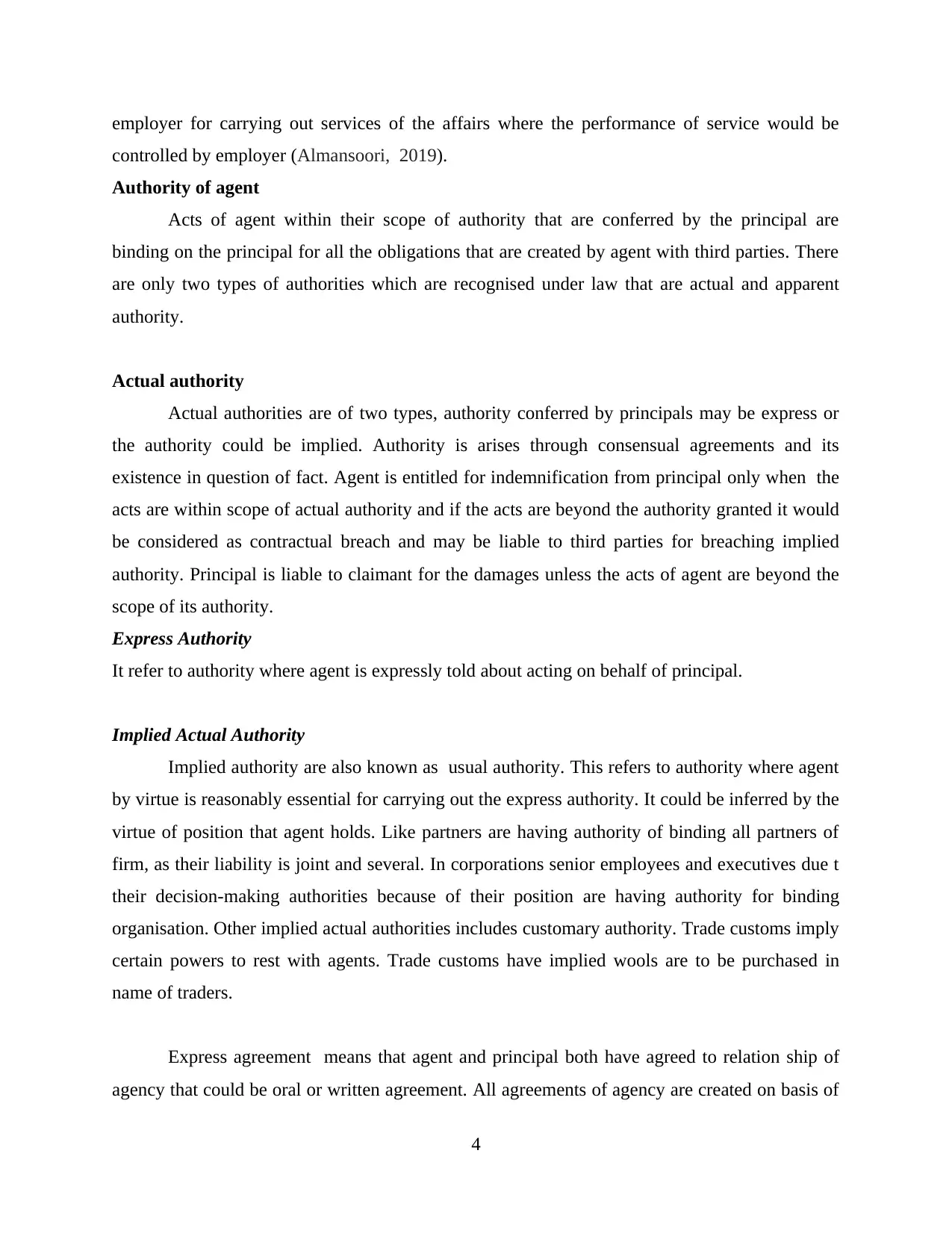
employer for carrying out services of the affairs where the performance of service would be
controlled by employer (Almansoori, 2019).
Authority of agent
Acts of agent within their scope of authority that are conferred by the principal are
binding on the principal for all the obligations that are created by agent with third parties. There
are only two types of authorities which are recognised under law that are actual and apparent
authority.
Actual authority
Actual authorities are of two types, authority conferred by principals may be express or
the authority could be implied. Authority is arises through consensual agreements and its
existence in question of fact. Agent is entitled for indemnification from principal only when the
acts are within scope of actual authority and if the acts are beyond the authority granted it would
be considered as contractual breach and may be liable to third parties for breaching implied
authority. Principal is liable to claimant for the damages unless the acts of agent are beyond the
scope of its authority.
Express Authority
It refer to authority where agent is expressly told about acting on behalf of principal.
Implied Actual Authority
Implied authority are also known as usual authority. This refers to authority where agent
by virtue is reasonably essential for carrying out the express authority. It could be inferred by the
virtue of position that agent holds. Like partners are having authority of binding all partners of
firm, as their liability is joint and several. In corporations senior employees and executives due t
their decision-making authorities because of their position are having authority for binding
organisation. Other implied actual authorities includes customary authority. Trade customs imply
certain powers to rest with agents. Trade customs have implied wools are to be purchased in
name of traders.
Express agreement means that agent and principal both have agreed to relation ship of
agency that could be oral or written agreement. All agreements of agency are created on basis of
4
controlled by employer (Almansoori, 2019).
Authority of agent
Acts of agent within their scope of authority that are conferred by the principal are
binding on the principal for all the obligations that are created by agent with third parties. There
are only two types of authorities which are recognised under law that are actual and apparent
authority.
Actual authority
Actual authorities are of two types, authority conferred by principals may be express or
the authority could be implied. Authority is arises through consensual agreements and its
existence in question of fact. Agent is entitled for indemnification from principal only when the
acts are within scope of actual authority and if the acts are beyond the authority granted it would
be considered as contractual breach and may be liable to third parties for breaching implied
authority. Principal is liable to claimant for the damages unless the acts of agent are beyond the
scope of its authority.
Express Authority
It refer to authority where agent is expressly told about acting on behalf of principal.
Implied Actual Authority
Implied authority are also known as usual authority. This refers to authority where agent
by virtue is reasonably essential for carrying out the express authority. It could be inferred by the
virtue of position that agent holds. Like partners are having authority of binding all partners of
firm, as their liability is joint and several. In corporations senior employees and executives due t
their decision-making authorities because of their position are having authority for binding
organisation. Other implied actual authorities includes customary authority. Trade customs imply
certain powers to rest with agents. Trade customs have implied wools are to be purchased in
name of traders.
Express agreement means that agent and principal both have agreed to relation ship of
agency that could be oral or written agreement. All agreements of agency are created on basis of
4
⊘ This is a preview!⊘
Do you want full access?
Subscribe today to unlock all pages.

Trusted by 1+ million students worldwide

intention of parties. However all agreements under agency are not express agreements, an agency
could be created by implied agreements (Bertolini, 2018). In both the above cases parties have
intention of creating relationship of agency. Agent works for principal under implied authority
instead of stated agreements.
Apparent authority
Apparent authority refers to authority where actions or words of principal leads the third
party with belief that tasks performed by agent are under the authority of principal even when
there were no discussions made on such relationship between the agents and the principal. A
person for example should be appointed on a position with all power that are associated with
agency. Generally people will make assumption who are not having such authority that there is
an apparent authority of carrying out actions which are ordinarily entrusted with the person
holding such position. If principal represents that there is an authority to agent for carrying out
the actions but there is no such authority actually existing, in such situations third parties are
protected against acts of agent up to extent the have adequately acted. This is also defined as
Doctrine of holding out or Agency by estoppel. In these circumstances authority granted by
principal cannot be denied, if third party's position is affected through reliance on such
representations.
The authority is actually coinciding with what is actually being represented. For instance
member of board is appointed as it managing director by the board of directors with authorities
that are not only implied but also apparent. Principal has obligation to third parties for the acts of
agent even if it did not had express or implied authority for such actions.
CASE LAWS
Hely Hutchinson vs Brayhead Ltd
Facts
Brayheasd ltd was sued by Lord Suidable for losses suffered due to failed deal for
takeover. Mr. Richards chairman, managing director and CEO of Brayhead guaranteed payments
of money and also for indemnification of losses occurred by Suirdale against investment of
money in company of Suirdale Perdio Electronics. Brayhead took over the company Perdio and
gave Suirdale the position on board of Brayhead, losses were not recovered by the business of
Perdio. Company suffered liquidation and after gave resignation from the position of board and
lodged suit against company for all losses incurred. Brayhead refused payment on base that
5
could be created by implied agreements (Bertolini, 2018). In both the above cases parties have
intention of creating relationship of agency. Agent works for principal under implied authority
instead of stated agreements.
Apparent authority
Apparent authority refers to authority where actions or words of principal leads the third
party with belief that tasks performed by agent are under the authority of principal even when
there were no discussions made on such relationship between the agents and the principal. A
person for example should be appointed on a position with all power that are associated with
agency. Generally people will make assumption who are not having such authority that there is
an apparent authority of carrying out actions which are ordinarily entrusted with the person
holding such position. If principal represents that there is an authority to agent for carrying out
the actions but there is no such authority actually existing, in such situations third parties are
protected against acts of agent up to extent the have adequately acted. This is also defined as
Doctrine of holding out or Agency by estoppel. In these circumstances authority granted by
principal cannot be denied, if third party's position is affected through reliance on such
representations.
The authority is actually coinciding with what is actually being represented. For instance
member of board is appointed as it managing director by the board of directors with authorities
that are not only implied but also apparent. Principal has obligation to third parties for the acts of
agent even if it did not had express or implied authority for such actions.
CASE LAWS
Hely Hutchinson vs Brayhead Ltd
Facts
Brayheasd ltd was sued by Lord Suidable for losses suffered due to failed deal for
takeover. Mr. Richards chairman, managing director and CEO of Brayhead guaranteed payments
of money and also for indemnification of losses occurred by Suirdale against investment of
money in company of Suirdale Perdio Electronics. Brayhead took over the company Perdio and
gave Suirdale the position on board of Brayhead, losses were not recovered by the business of
Perdio. Company suffered liquidation and after gave resignation from the position of board and
lodged suit against company for all losses incurred. Brayhead refused payment on base that
5
Paraphrase This Document
Need a fresh take? Get an instant paraphrase of this document with our AI Paraphraser
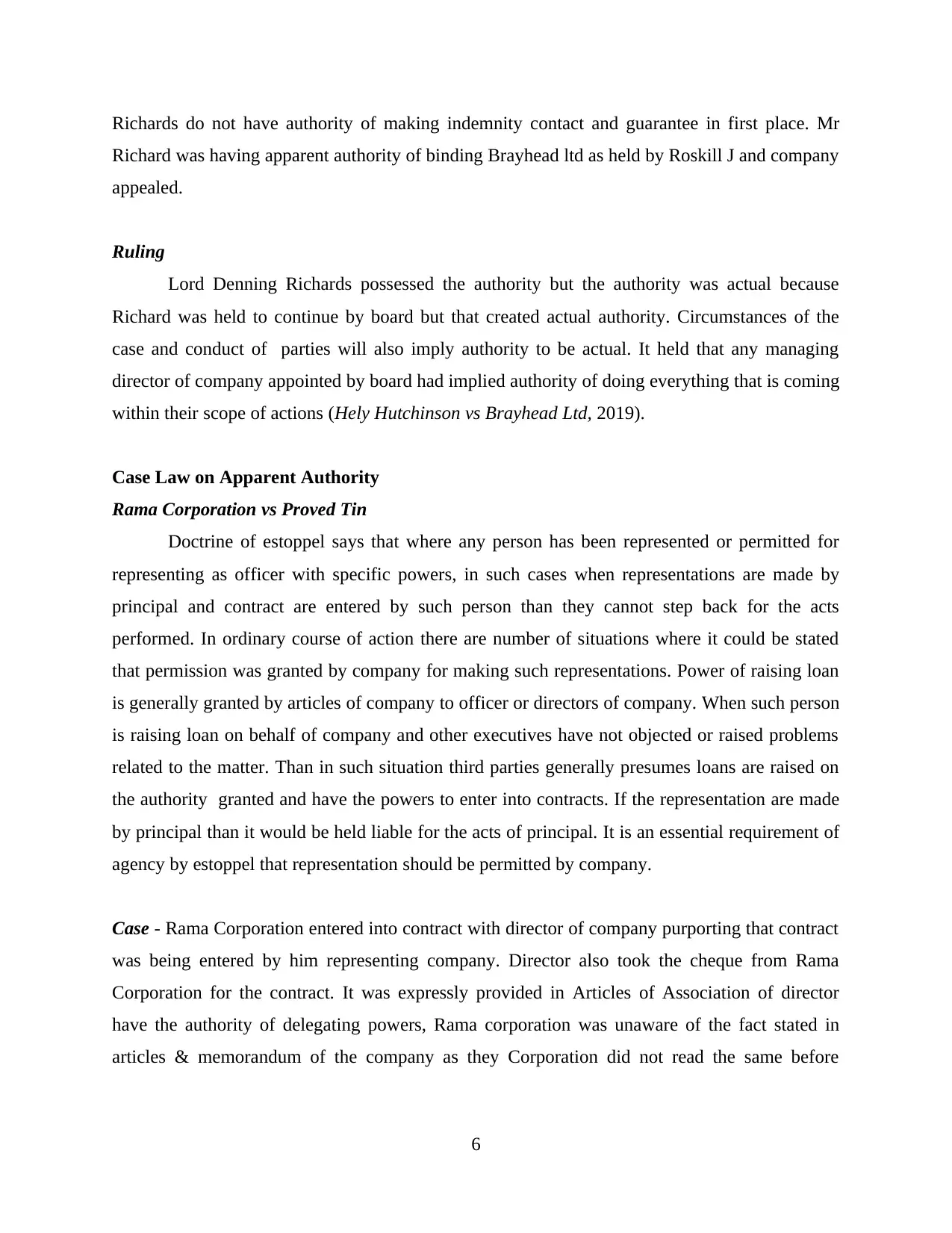
Richards do not have authority of making indemnity contact and guarantee in first place. Mr
Richard was having apparent authority of binding Brayhead ltd as held by Roskill J and company
appealed.
Ruling
Lord Denning Richards possessed the authority but the authority was actual because
Richard was held to continue by board but that created actual authority. Circumstances of the
case and conduct of parties will also imply authority to be actual. It held that any managing
director of company appointed by board had implied authority of doing everything that is coming
within their scope of actions (Hely Hutchinson vs Brayhead Ltd, 2019).
Case Law on Apparent Authority
Rama Corporation vs Proved Tin
Doctrine of estoppel says that where any person has been represented or permitted for
representing as officer with specific powers, in such cases when representations are made by
principal and contract are entered by such person than they cannot step back for the acts
performed. In ordinary course of action there are number of situations where it could be stated
that permission was granted by company for making such representations. Power of raising loan
is generally granted by articles of company to officer or directors of company. When such person
is raising loan on behalf of company and other executives have not objected or raised problems
related to the matter. Than in such situation third parties generally presumes loans are raised on
the authority granted and have the powers to enter into contracts. If the representation are made
by principal than it would be held liable for the acts of principal. It is an essential requirement of
agency by estoppel that representation should be permitted by company.
Case - Rama Corporation entered into contract with director of company purporting that contract
was being entered by him representing company. Director also took the cheque from Rama
Corporation for the contract. It was expressly provided in Articles of Association of director
have the authority of delegating powers, Rama corporation was unaware of the fact stated in
articles & memorandum of the company as they Corporation did not read the same before
6
Richard was having apparent authority of binding Brayhead ltd as held by Roskill J and company
appealed.
Ruling
Lord Denning Richards possessed the authority but the authority was actual because
Richard was held to continue by board but that created actual authority. Circumstances of the
case and conduct of parties will also imply authority to be actual. It held that any managing
director of company appointed by board had implied authority of doing everything that is coming
within their scope of actions (Hely Hutchinson vs Brayhead Ltd, 2019).
Case Law on Apparent Authority
Rama Corporation vs Proved Tin
Doctrine of estoppel says that where any person has been represented or permitted for
representing as officer with specific powers, in such cases when representations are made by
principal and contract are entered by such person than they cannot step back for the acts
performed. In ordinary course of action there are number of situations where it could be stated
that permission was granted by company for making such representations. Power of raising loan
is generally granted by articles of company to officer or directors of company. When such person
is raising loan on behalf of company and other executives have not objected or raised problems
related to the matter. Than in such situation third parties generally presumes loans are raised on
the authority granted and have the powers to enter into contracts. If the representation are made
by principal than it would be held liable for the acts of principal. It is an essential requirement of
agency by estoppel that representation should be permitted by company.
Case - Rama Corporation entered into contract with director of company purporting that contract
was being entered by him representing company. Director also took the cheque from Rama
Corporation for the contract. It was expressly provided in Articles of Association of director
have the authority of delegating powers, Rama corporation was unaware of the fact stated in
articles & memorandum of the company as they Corporation did not read the same before
6

entering into transaction. Afterwards it was identified that powers were never delegated to Mr X
(Rama Corporation v Proved Tin, 2019).
Ruling -It was held by the court that plaintiff cannot avail remedy under indoor manage because
they were not aware of the fact that powers of could also be delegated. Rule could not be
invoked on ground that they were not having knowledge of memorandum or articles and
therefore relied over them.
Indoor management
This law strikes the provisions of indoor management. This rule is also known as
Turquand rule. Doctrine of indoor management provides protection to outsiders against acts of
corporations. All the person dealing cannot be assumed to have knowledge about internal
workings and operations of business. Company is required to inform before entering into the
transaction that they are authorised to act on behalf of company (Hossain, 2015). In such
situations where third party enters into contract without the knowledge that counter party is
making false contract or in order to deceive the party, than third party is protected against such
deception.
Ratification of Agency
Ratification means accepting the previous actions of agent which were not binding to
principal. By ratification actual authority is created between agent and the principal relationship
retrospectively or retroactively. There are certain conditions that are required to be met before
the ratification. Actions performed by agent should have been done expressly for principal. Third
should have complete knowledge that actions are taken on authority from principal. Ratification
cannot be done for falsified acts or acts of forgery (Tyler, 2016).
CONCLUSION
From the above study it could be concluded that agency have fiduciary relation between
principal and agent. Agents are authorised by principal for acting on their behalf. Agents are
appointed for various purposes and relationship is designed on the basis of their intentions. In the
present times agency relationship is playing very vital role. Report have revealed that it is
7
(Rama Corporation v Proved Tin, 2019).
Ruling -It was held by the court that plaintiff cannot avail remedy under indoor manage because
they were not aware of the fact that powers of could also be delegated. Rule could not be
invoked on ground that they were not having knowledge of memorandum or articles and
therefore relied over them.
Indoor management
This law strikes the provisions of indoor management. This rule is also known as
Turquand rule. Doctrine of indoor management provides protection to outsiders against acts of
corporations. All the person dealing cannot be assumed to have knowledge about internal
workings and operations of business. Company is required to inform before entering into the
transaction that they are authorised to act on behalf of company (Hossain, 2015). In such
situations where third party enters into contract without the knowledge that counter party is
making false contract or in order to deceive the party, than third party is protected against such
deception.
Ratification of Agency
Ratification means accepting the previous actions of agent which were not binding to
principal. By ratification actual authority is created between agent and the principal relationship
retrospectively or retroactively. There are certain conditions that are required to be met before
the ratification. Actions performed by agent should have been done expressly for principal. Third
should have complete knowledge that actions are taken on authority from principal. Ratification
cannot be done for falsified acts or acts of forgery (Tyler, 2016).
CONCLUSION
From the above study it could be concluded that agency have fiduciary relation between
principal and agent. Agents are authorised by principal for acting on their behalf. Agents are
appointed for various purposes and relationship is designed on the basis of their intentions. In the
present times agency relationship is playing very vital role. Report have revealed that it is
7
⊘ This is a preview!⊘
Do you want full access?
Subscribe today to unlock all pages.

Trusted by 1+ million students worldwide

important to have appropriate agreements between the principal and agent. The express or
implied authorities should be properly understood before entering into transactions.
8
implied authorities should be properly understood before entering into transactions.
8
Paraphrase This Document
Need a fresh take? Get an instant paraphrase of this document with our AI Paraphraser
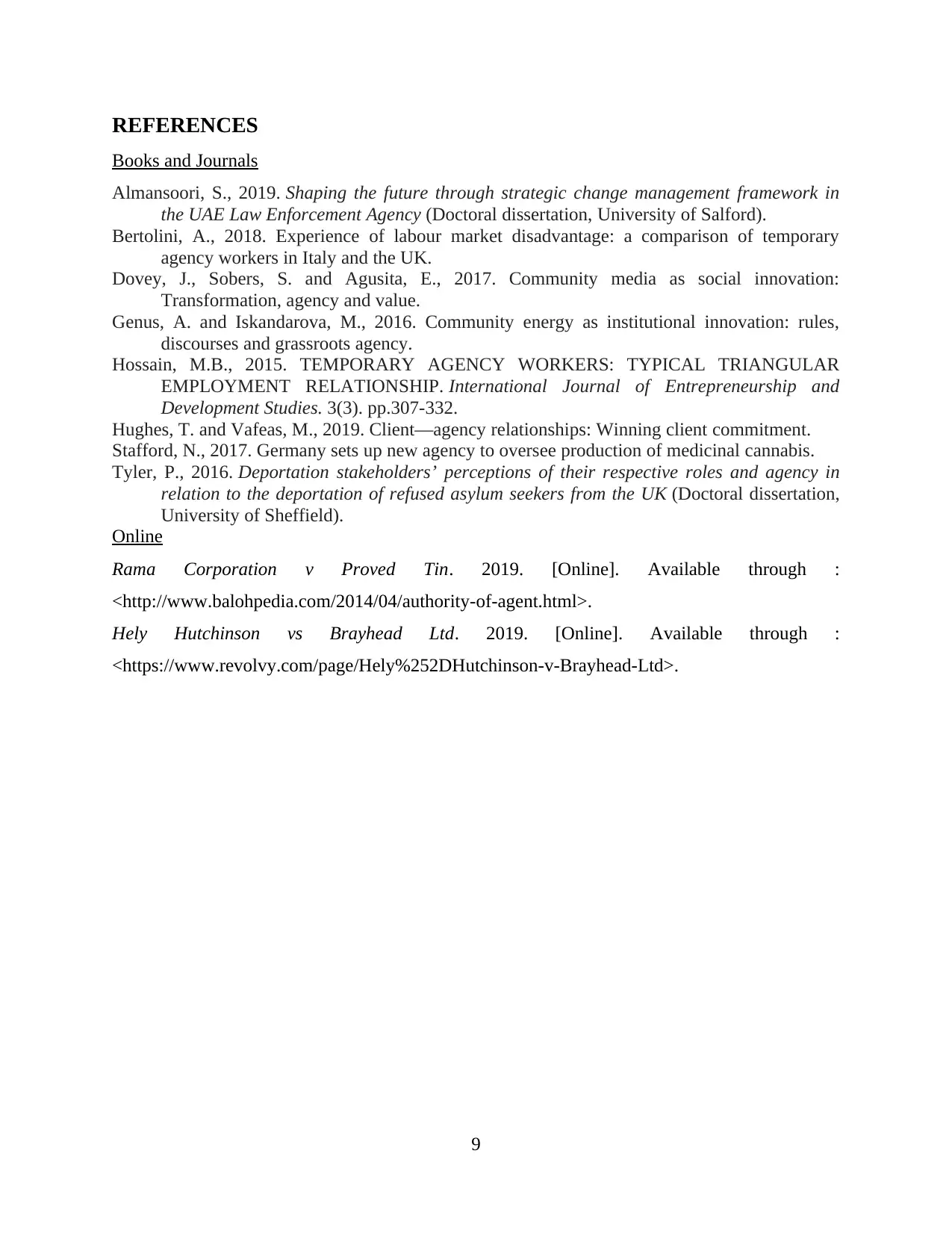
REFERENCES
Books and Journals
Almansoori, S., 2019. Shaping the future through strategic change management framework in
the UAE Law Enforcement Agency (Doctoral dissertation, University of Salford).
Bertolini, A., 2018. Experience of labour market disadvantage: a comparison of temporary
agency workers in Italy and the UK.
Dovey, J., Sobers, S. and Agusita, E., 2017. Community media as social innovation:
Transformation, agency and value.
Genus, A. and Iskandarova, M., 2016. Community energy as institutional innovation: rules,
discourses and grassroots agency.
Hossain, M.B., 2015. TEMPORARY AGENCY WORKERS: TYPICAL TRIANGULAR
EMPLOYMENT RELATIONSHIP. International Journal of Entrepreneurship and
Development Studies. 3(3). pp.307-332.
Hughes, T. and Vafeas, M., 2019. Client—agency relationships: Winning client commitment.
Stafford, N., 2017. Germany sets up new agency to oversee production of medicinal cannabis.
Tyler, P., 2016. Deportation stakeholders’ perceptions of their respective roles and agency in
relation to the deportation of refused asylum seekers from the UK (Doctoral dissertation,
University of Sheffield).
Online
Rama Corporation v Proved Tin. 2019. [Online]. Available through :
<http://www.balohpedia.com/2014/04/authority-of-agent.html>.
Hely Hutchinson vs Brayhead Ltd. 2019. [Online]. Available through :
<https://www.revolvy.com/page/Hely%252DHutchinson-v-Brayhead-Ltd>.
9
Books and Journals
Almansoori, S., 2019. Shaping the future through strategic change management framework in
the UAE Law Enforcement Agency (Doctoral dissertation, University of Salford).
Bertolini, A., 2018. Experience of labour market disadvantage: a comparison of temporary
agency workers in Italy and the UK.
Dovey, J., Sobers, S. and Agusita, E., 2017. Community media as social innovation:
Transformation, agency and value.
Genus, A. and Iskandarova, M., 2016. Community energy as institutional innovation: rules,
discourses and grassroots agency.
Hossain, M.B., 2015. TEMPORARY AGENCY WORKERS: TYPICAL TRIANGULAR
EMPLOYMENT RELATIONSHIP. International Journal of Entrepreneurship and
Development Studies. 3(3). pp.307-332.
Hughes, T. and Vafeas, M., 2019. Client—agency relationships: Winning client commitment.
Stafford, N., 2017. Germany sets up new agency to oversee production of medicinal cannabis.
Tyler, P., 2016. Deportation stakeholders’ perceptions of their respective roles and agency in
relation to the deportation of refused asylum seekers from the UK (Doctoral dissertation,
University of Sheffield).
Online
Rama Corporation v Proved Tin. 2019. [Online]. Available through :
<http://www.balohpedia.com/2014/04/authority-of-agent.html>.
Hely Hutchinson vs Brayhead Ltd. 2019. [Online]. Available through :
<https://www.revolvy.com/page/Hely%252DHutchinson-v-Brayhead-Ltd>.
9
1 out of 11
Related Documents
Your All-in-One AI-Powered Toolkit for Academic Success.
+13062052269
info@desklib.com
Available 24*7 on WhatsApp / Email
![[object Object]](/_next/static/media/star-bottom.7253800d.svg)
Unlock your academic potential
Copyright © 2020–2026 A2Z Services. All Rights Reserved. Developed and managed by ZUCOL.





